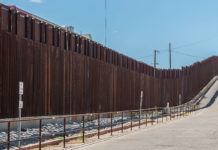Mexican drug cartels have headquarters throughout the United States and are one of the country’s greatest criminal, national security and public health threats, according to a veteran Drug Enforcement Administration (DEA) senior agent pushing the federal government to designate them as Foreign Terrorist Organizations (FTO).
“The Mexican cartels have left a trail of blood using intimidation and terrorist acts of ruthless violence,” said Derek S. Maltz, a narco-terror expert who helped establish the Counter Narco-Terrorism Operations Center (CNTOC) before retiring from the DEA. The CNTOC has busted many bigtime narco-terrorism operations, including a money laundering scheme that supported the Lebanese terrorist group Hezbollah.
“The cartels engage in beheadings, car bombings, dissolving humans in acid, mass murders, torture, bombings and political assassinations,” Maltz said. “Their actions are consistent with the behaviors of traditional terrorists and they have infiltrated the highest levels of the Mexican government with bribes and corruption.”
The former DEA agent added that “Mexican drug cartels have utilized techniques which focus on mind manipulation and behavioral modification commonly utilized by organizations such as Al-Qaeda.” The troubling details were delivered during recent testimony before the Ohio legislature, where Maltz made a powerful case for designating Mexican drug cartels as FTOs. Following a massive bust of the notorious Sinaloa Cartel in the Buckeye State, a resolution was introduced to get the federal government to make the change so that it may use “appropriate means to mitigate and eventually eliminate the operations of the cartels.”
Last week a criminal justice committee heard testimony as the resolution advances in the Ohio legislature. Maltz was a key expert witness, telling the panel that cartels “have major hubs in Southern California, Arizona, Chicago, Texas, New York and Atlanta” and have “expanded into South Florida.”
The resolution states that Transitional Criminal Organizations (TCO) based in Mexico (drug cartels) are responsible for the flow of opioids across the border into the United States and Ohio and that they are also responsible for the proliferation of human trafficking in the United States, particularly Ohio, as part and parcel of their drug trafficking operations.
The measure points out that drug cartels conduct operations on U.S. soil in furtherance of drug and human trafficking and that abuse of opioids and human trafficking are direct threats to the economy, well-being and overall vitality of the state of Ohio and its citizens. “The acting administrator of the United States Drug Enforcement Administration, Uttam Dhillon, recently declared Mexican drug trafficking organizations are the biggest criminal threat the United States faces today,” the Ohio resolution states.
The measure further points out that the Immigration and Nationality Act authorizes the U.S. Secretary of State, in consultation with the Secretary of the Treasury and the Attorney General, to designate an organization as an FTO when certain criteria are met. Drug cartels meet the criteria, Ohio lawmakers assert, because they are foreign in nature, engage in or retain the capability and intent to engage in terrorism and threaten the security of American citizens and the national defense, foreign relations and economic interests of the United States.
Judicial Watch made parallel arguments in a White Paper published earlier this year. In it, Judicial Watch’s investigative team provides comprehensive documentation that Mexican drug cartels, notoriously sophisticated criminal operations, undoubtedly meet the U.S. government’s requirements to be designated FTOs.
The criteria for FTO designation require that organizations be foreign, engage in terrorism or terrorist activity or possess the capability and intent to do so and pose a threat to U.S. nationals or U.S. national security.
Mexican drug cartels are inherently foreign, routinely commit criminal acts within the statutory definition of terrorism and arguably represent a more immediate and ongoing threat to U.S. national security than any of the currently-designated FTOs on the State Department list.






























